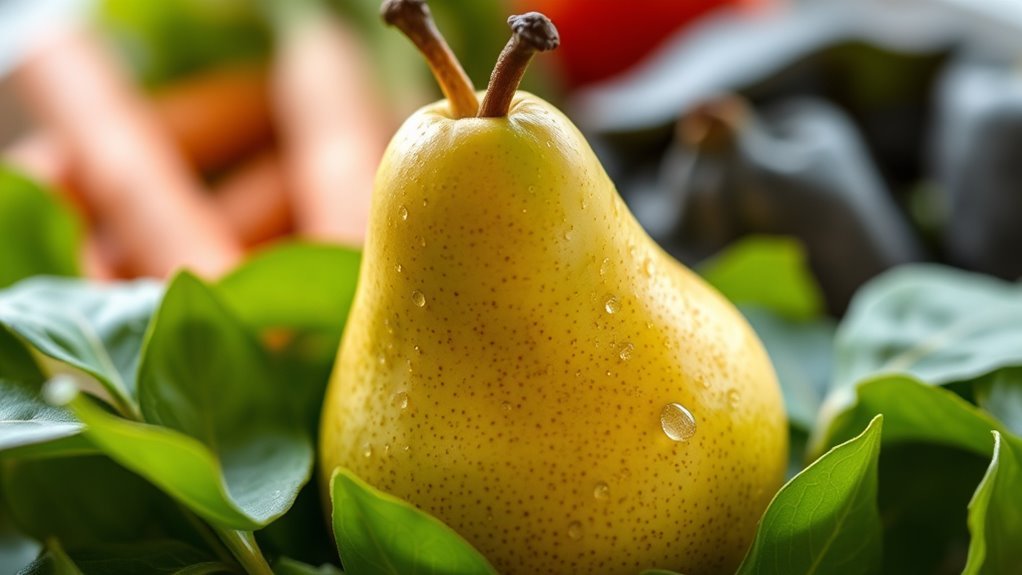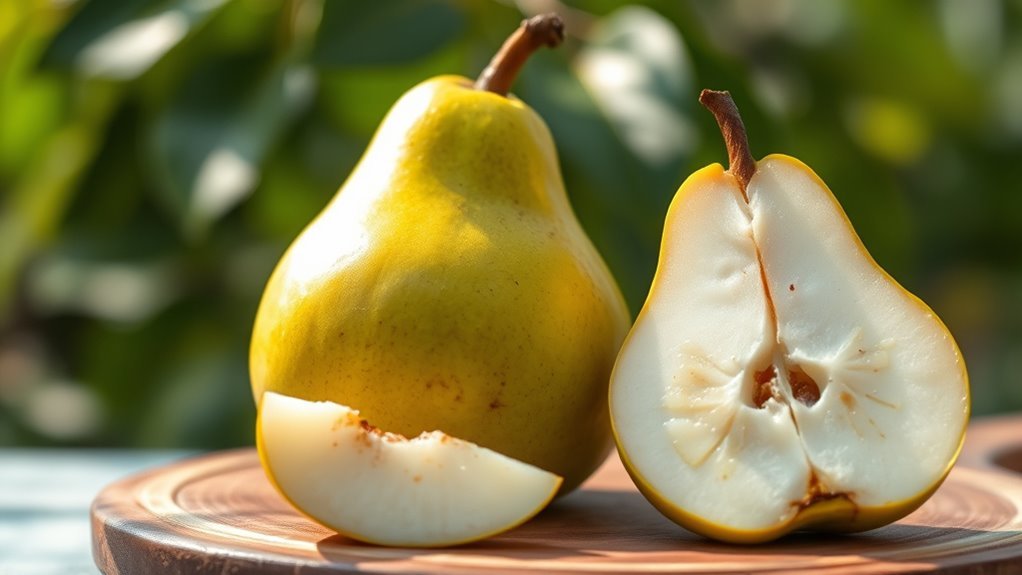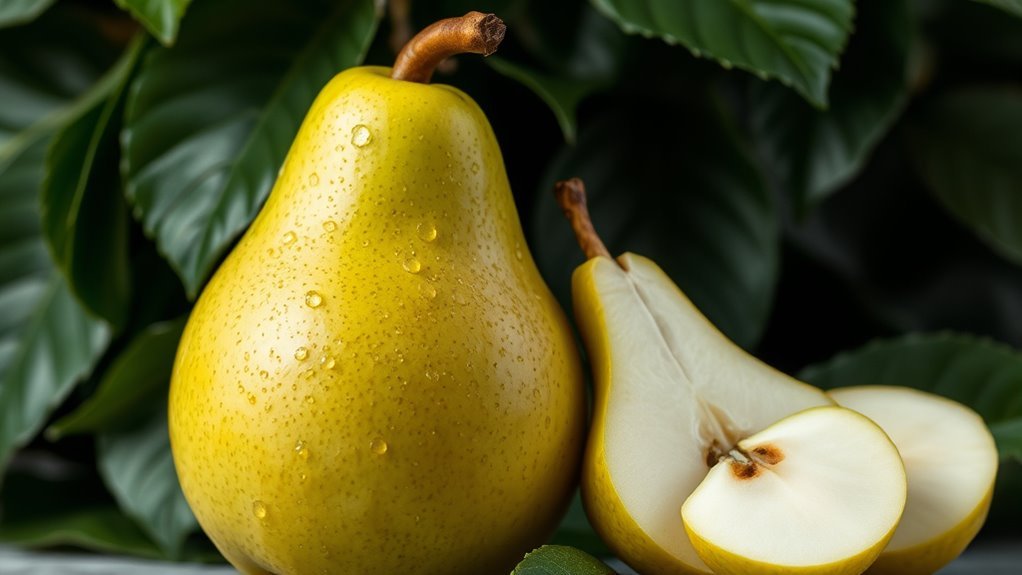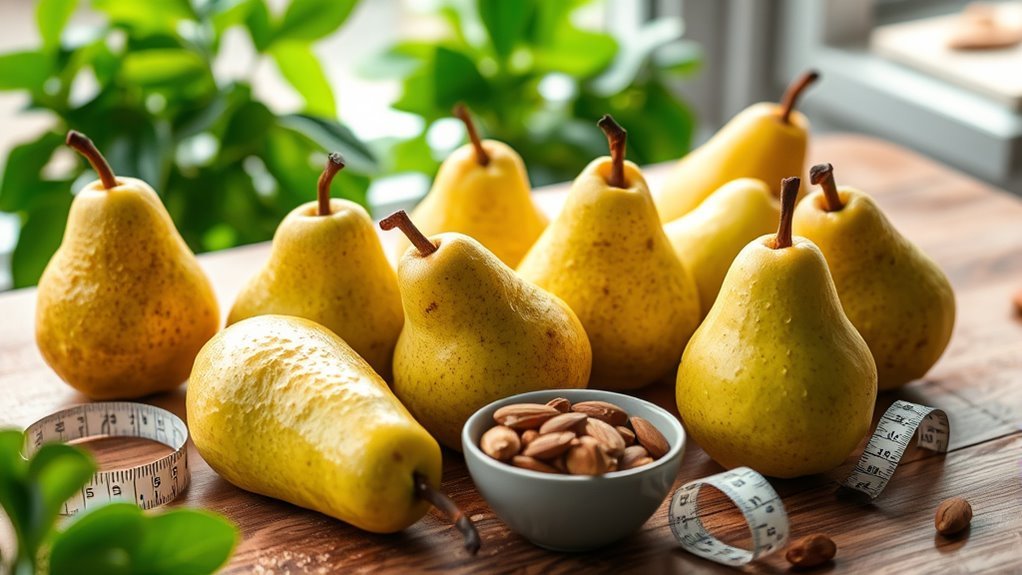Pears aren’t typically considered keto-friendly due to their higher carbohydrate content, with a medium pear containing about 28 grams of carbs and 17 grams of sugar. This makes portion control essential for anyone following a ketogenic diet. While pears offer health benefits like fiber and vitamins, mindful consumption is key. Smaller servings can satisfy your cravings without derailing your diet. If you’d like more tips on incorporating pears and other fruits, keep exploring your options.
Nutritional Profile of Pears

When it comes to the nutritional profile of pears, these fruits pack a surprisingly robust punch. You’ll find that various pears varieties, like Bartlett and Bosc, offer unique flavors and textures, but they all share impressive health benefits. Pears are particularly notable for their high fiber content, which can aid digestion and promote a feeling of fullness. A medium-sized pear contains about 5-6 grams of dietary fiber, making it a great choice for those looking to improve their gut health. Additionally, they’re rich in vitamins C and K, which support immune function and bone health. Incorporating pears into your diet can provide a delicious, nutritious option that aligns with your desire for freedom in healthy eating.
Carb Content of Pears

Although pears are known for their health benefits, their carbohydrate content is an important factor to take into account, especially for those following a ketogenic diet. A medium pear typically contains around 28 grams of carbohydrates, which includes roughly 17 grams of sugar. This carbohydrate breakdown can be significant, considering the keto diet generally limits daily carb intake to about 20-50 grams. While pears provide fiber and essential vitamins, their higher sugar content could hinder your progress if you’re aiming for ketosis. If you’re looking to enjoy pears while staying keto-friendly, it’s vital to monitor portion sizes to guarantee you remain within your carb limits. Balancing your intake is key to maintaining your dietary goals.
Glycemic Index and Its Importance

Understanding the glycemic index (GI) of foods like pears is important for anyone following a ketogenic or low-carb diet. The GI measures how quickly a food raises your blood sugar levels after consumption. Foods with a low GI lead to a slower, more stable glycemic response, which can be beneficial for maintaining energy and avoiding spikes in blood sugar. In contrast, high-GI foods can cause rapid fluctuations that may hinder your keto journey. While pears have a moderate GI, it’s crucial to contemplate portion sizes and their impact on your overall carbohydrate intake. By being mindful of the glycemic index, you can make informed choices that align with your dietary goals, ensuring you enjoy the freedom of a balanced, low-carb lifestyle.
Comparing Pears to Other Fruits
While pears can be a nutritious choice, it’s important to compare them to other fruits to understand their place in a ketogenic diet. Different pear varieties, like Bartlett or Anjou, each have unique sugar content. In fruit comparisons, you might find that berries often rank lower in carbs, making them a more keto-friendly option.
Here’s a quick look at some common fruits and their carbohydrate content:
| Fruit | Carbs per 100g |
|---|---|
| Pear (Bartlett) | 15g |
| Blueberries | 14g |
| Strawberries | 8g |
As you can see, while pears have a moderate carb content, choosing fruits wisely can help you stay within your keto limits. Always consider portion sizes and overall daily carb intake for best results.
Health Benefits of Pears
Pears are packed with essential nutrients, making them a great addition to your diet. They boast impressive antioxidant properties that help combat oxidative stress in your body. By incorporating pears into your meals, you can enjoy both their flavor and health benefits.
Nutrient Density Profile
Although many fruits are often lauded for their health benefits, the nutrient density profile of pears makes them a standout choice. Rich in dietary fiber, pears can help support digestive health and promote a feeling of fullness, making them a great addition to any diet. Their vitamin profile is impressive too, as they provide essential vitamins like C and K, contributing to immune function and bone health. With their low calorie count and high nutrient content, pears offer a balanced option for those seeking to maintain overall well-being. Enjoying pears can be a delicious way to fuel your body while reaping the benefits of their fiber and vitamins, allowing you the freedom to indulge in healthy eating.
Antioxidant Properties
When you consider the health benefits of fruits, it’s important to highlight the impressive antioxidant properties found in pears. These delicious fruits are packed with antioxidants, which play an essential role in fighting oxidative stress and reducing inflammation in your body. The flavonoid content in pears, particularly quercetin, offers significant antioxidant benefits that can help protect your cells from damage. Incorporating pears into your diet can support your overall health by potentially lowering the risk of chronic diseases, such as heart disease and certain cancers. Plus, their natural sweetness and crisp texture make them an enjoyable addition to your meals. So, if you’re looking for a tasty and nutritious fruit, pears might just be the perfect choice for you.
How to Incorporate Pears Into a Keto Diet
Incorporating pears into a keto diet can be a delicious challenge, but it’s definitely possible with the right approach. You can explore creative recipe ideas that highlight their flavor while keeping an eye on portion control to maintain your carb limits. By balancing these elements, you can enjoy the benefits of pears without straying from your keto goals.
Recipe Ideas With Pears
How can you enjoy the sweet, juicy flavor of pears while sticking to a keto diet? You can create delicious pear salads by combining diced pears with leafy greens, walnuts, cheese, and a low-carb dressing. This mix provides a revitalizing crunch without overwhelming your carb count. Alternatively, consider making a pear smoothie using unsweetened almond milk, a small portion of ripe pear, and a scoop of protein powder. This way, you can savor the pear’s natural sweetness while keeping carbs in check. Just remember to balance your portions to fit within your daily carb limits. With these simple ideas, you can enjoy the unique taste of pears while still embracing the freedom of a keto lifestyle.
Portion Control Strategies
Enjoying pears on a keto diet doesn’t have to be complicated, especially when you focus on portion control. Start by determining your ideal portion sizes; a small pear typically contains about 15 grams of carbs. Consider slicing your pear and pairing it with a high-fat option like cheese or nut butter. This not only enhances the flavor but also helps maintain your keto goals. Practicing mindful eating can further support your journey. Take time to savor the taste and texture of your pear, which can prevent overeating. Remember, it’s all about balance. Enjoy the freedom of including pears in your diet while staying aware of how they fit into your overall carb intake.
Portion Control and Serving Suggestions
While pears can be a delicious addition to a keto diet, portion control is essential to maintain your carbohydrate goals. Mindful eating is key—being aware of serving sizes allows you to enjoy pears without overindulging. Here are some serving suggestions:
- Slice it up: Enjoy half a pear with a handful of nuts for a balanced snack.
- Add to salads: Toss a few thin slices into your green salad to add flavor without going overboard.
- Pair with cheese: A small wedge of pear alongside a serving of cheese can satisfy your cravings while keeping carbs in check.
Alternative Low-Carb Fruits to Consider
If you’re looking to diversify your fruit intake while sticking to a low-carb lifestyle, there are several alternatives to pears that can fit seamlessly into your diet. Low carb berries, such as strawberries, raspberries, and blackberries, are excellent choices. They’re not only low in carbs but also rich in antioxidants and vitamins. Keto-friendly melons like cantaloupe and watermelon are invigorating options too; just be mindful of portion sizes. Both these fruit categories can satisfy your sweet cravings without derailing your goals. Incorporating these alternatives can keep your meals interesting while ensuring you stay within your carb limits. Remember, it’s all about balance and making informed choices that align with your lifestyle. Enjoy experimenting with these delicious options!
Frequently Asked Questions about Pears and the Keto Diet
1. Are pears considered keto friendly?
Pears are generally not considered keto-friendly due to their higher carbohydrate content compared to other low-carb fruits. A medium pear contains approximately 28 grams of carbohydrates, which can take up a significant portion of the daily carb allowance for those following a strict ketogenic diet. However, if consumed in moderation and adjusted within your daily carb limits, they can be included in a more flexible keto approach.
2. How many carbs are in a pear?
A medium-sized pear contains about 28 grams of carbohydrates, including around 5 grams of fiber. This means the net carbs (total carbs minus fiber) would be approximately 23 grams. This carbohydrate level is relatively high for a keto diet, which typically limits daily intake to around 20-50 grams of net carbs.
3. Can I eat pears on a low-carb diet?
Yes, you can eat pears on a low-carb diet, but it’s important to do so in moderation. While they are nutritious and provide vitamins, minerals, and fiber, their carbohydrate content means that you should account for them in your daily carb intake. If you’re following a more lenient low-carb plan, a small portion of pear may fit into your diet without exceeding your carb limits.
4. What are some low-carb alternatives to pears?
If you’re looking for low-carb fruit alternatives to pears, consider options like berries (strawberries, raspberries, and blackberries), which have lower carbohydrate content. Avocados are also a great choice since they are low in carbs and high in healthy fats, making them ideal for a keto diet. Other alternatives include olives and coconut, which can offer a fruity flavor without the high carb count.
5. Are there any health benefits to eating pears?
Yes, pears are rich in dietary fiber, vitamins C and K, and antioxidants, which can contribute to overall health. The fiber content can help with digestion and promote a feeling of fullness, which is beneficial for weight management. While they may not fit perfectly into a keto diet, incorporating them occasionally can provide health benefits, especially if you balance your overall carbohydrate intake.
References
- https://www.healthline.com/nutrition/keto-diet-foods
- https://www.ncbi.nlm.nih.gov/pmc/articles/PMC6466404/
- https://www.washingtonpost.com/food/2021/10/26/keto-diet-healthy-foods/
- https://www.dietaryguidelines.gov/
- https://www.mayoclinic.org/healthy-lifestyle/nutrition-and-healthy-eating/expert-answers/keto-diet/faq-20459636
- https://www.webmd.com/diet/what-is-the-keto-diet#1
- https://www.verywellfit.com/keto-diet-foods-5118218
- https://www.cdc.gov/nutrition/index.html


